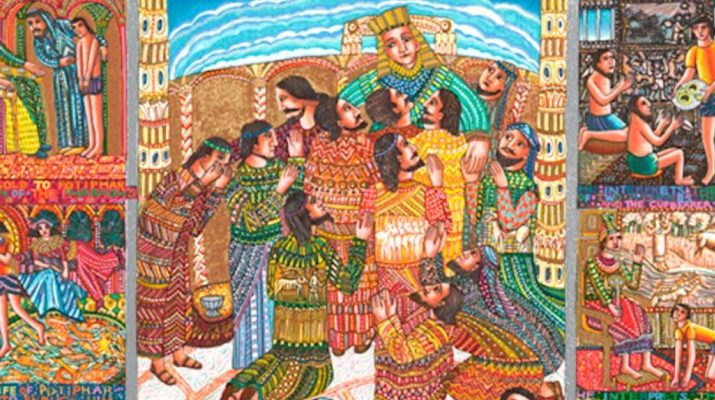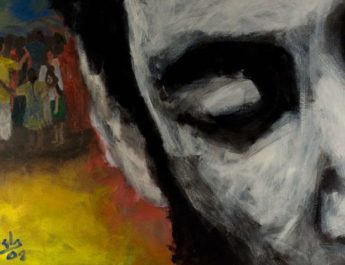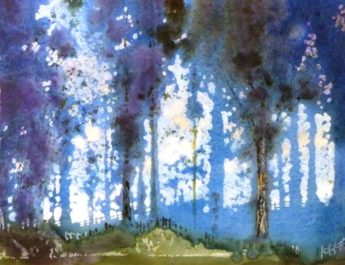Genesis 45:1-15
Ordinary A38
BibleHub
1 Then JosephA could no longer controlB himself before all those who stoodC by him, and he cried out,D “Send everyoneE away from me.”
Notes on verse 1a
A “Joseph” = Yoseph. From yasaph (to add, increase, continue, exceed). This is Joseph, meaning “he increases” or “let him add.”
B “control” = aphaq. 7x in OT. This is to be strong, force, control, hold. It can also be to abstain or force oneself.
C “who stood” = natsab. This is to station, appoint, establish, take a stand.
D “cried out” = qara. This is to call or call out – to call someone by name. Also used more broadly for calling forth.
E “everyone” = kol + ish. Literally “all man” (man is singular). Ish is perhaps from enosh (human, humankind, mortal); from anash (to be weak, sick, or frail). This is man, husband, another, or humankind.
So no oneF stayedG with him when Joseph made himself knownH to his brothers.I
Notes on verse 1b
F “one” = ish. Same as “everyone” in v1. See note E above.
G “stayed” = amad. This is to stand up in a literal or figurative sense. So it can be establish, continue, endure, take a stand, act, be a servant, stand still, remain, stand against an enemy.
H “made…known” = yada. This is to know, acknowledge, advise, answer, be aware, be acquainted with. Properly, this is to figure something out by seeing. It includes ideas of observation, recognition, and care about something. It can be used causatively for instruction, designation, and punishment.
I “brothers” = ach. This is brother, kindred, another, other, like. It is literally brother, but it can also be someone who is similar, resembling, or related to.
2 And he wept so loudlyJ that the EgyptiansK heardL it, and the householdM of PharaohN heard it.
Notes on verse 2
J “wept so loudly” = natan + et + qol + beki. Literally “he gave a voice of weeping.” Qol is a sound, used often for human voices. Also used when God speaks or angels, animals or instruments. It can be a cry or a noise, thunder or earthquakes and so on. Beki is from bakah (to weep, complain, lament). This is ongoing weeping, overflowing. By analogy, this can also mean dripping.
K “Egyptians” = mitsri. From the same as mitsrayim (Egypt); perhaps from matsor (besieged or fortified place, bulwark, entrenchment; something hemmed in; a siege or distress or fastness); from tsur (to confine, besiege, to cramp). This is Egyptian.
L “heard” = shama. This is to hear, call, consent, or consider. It implies listening intelligently, giving attention, and, because of these two factors, obedience and action are often implied.
M “household” = bayit. Probably from banah (to build, make, set up, obtain children; to build literally or figuratively). This is house, court, family, palace, temple.
N “Pharaoh” = paroh. From Egyptian pr (palace, pharaoh; literally house + great). This is Pharaoh, a title for Egyptian kings. See https://en.wiktionary.org/wiki/pharaoh
3 Joseph said to his brothers, “I am Joseph. Is my father still alive?”O But his brothers could not answerP him, so dismayedQ were they at his presence.R
Notes on verse 3
O “alive” = chay. From chayah (to live or keep alive literally or figuratively). This is alive, living, lifetime. It can also be used to describe someone’s age. It can refer to animals, plants, water, or a company or congregation of people. It is life in a very broad sense.
P “answer” = anah. This is answer, respond, announce, sing, shout, or testify. It means to pay attention, which implies responding and, by extension, starting to talk. Used in a specific sense for singing, shouting, testifying, etc.
Q “dismayed” = bahal. To be afraid or dismayed or amazed. This is deep trembling within. So, figuratively, it refers to being suddenly agitated. This implies moving or acting quickly/anxiously.
R “presence” = paneh. Literally “from his face.” From panah (to turn, face, appear). This is face in a literal or figurative sense. It could be face, presence, anger, respect. It can also be used of God to indicate divine favor or presence.
4 Then Joseph said to his brothers, “Come closerS, T to me.” And they came closer. He said, “I am your brother, Joseph, whom you soldU into Egypt.V
Notes on verse 4
S “come closer” = nagash. This is to draw, bring, or come near. It is approaching for any reason – as an attack on an enemy, in order to worship, to make an argument. It can also be used as a euphemism for sex.
T {untranslated} = na. This particle is used for requests or for urging. It can be we pray, now, I ask you, oh. This is the same “na” in “hosanna.”
U “sold” = makar. This is to sell – could be commerce/trade, a daughter to be married, someone into slavery. Figuratively, it can mean to surrender.
V “Egypt” = mitsrayim. Related to “Egyptians” in v2. See note K above.
5 And now do not be distressed,W or angryX with yourselves,Y because you sold me here;Z for GodAA sent me before youBB to preserve life.CC
Notes on verse 5
W “be distressed” = atsab. 17x in OT – 4x of humanity grieving God including Genesis 6:6 prior to the Flood. This is properly to carve. So it can mean to create or fashion. Figuratively, it means to hurt, grieve, worry, anger, or displease.
X “angry” = charah. Perhaps related to charar (to be hot, burn, glow, melt, be scorched; figuratively, to incite passion, be angry). This is to be displeased, burn with anger, glow, become warn. Figuratively it is a blaze of anger, zeal, or jealousy.
Y “with yourselves” = ayin. Literally “with your eyes.” This is eye in a literal or figurative sense so eye, appearance, favor, or a fountain (the eye of the landscape).
Z “here” = hennah. Perhaps from hen (lo! Behold! If, though; an expression of surprise). This is here in a location or here in a time, i.e. now.
AA “God” = Elohim.
BB “before you” = paneh. Literally “before your faces.” Same as “presence” in v3. See note R above.
CC “preserve life” = michyah. Related to “alive” in v3. 8x in OT. From chayah (see note O above). This is substance, reviving, preserving life.
6 For the famineDD has been inEE the land these two years; and there are five more years in which there will be neither plowingFF nor harvest.GG
Notes on verse 6
DD “famine” = raab. From raeb (to be hungry). This is hunger, death, or hunger from famine.
EE “in” = qereb. Perhaps from qarab (to come near or approach). This is among, in the midst, before, the center It is the inward part, whether literal or figurative. It can also be used for the heart, the site of thoughts and feelings. This word is also used as a technical term for the entrails of the animals who are sacrificed.
FF “plowing” = charish. 3x in OT. From charash (to scratch, which implies etching or plowing; to manufacture regardless of materials used; figuratively, to devise or conceal; a sense of secrecy so being silent or left alone or speechless). This is plowing or the season in which one plows. It can also refer to the ground.
GG “harvest” = qatsiyr. From qatsar (to cut down, be short, reap, curtail; used especially for harvesting grass or grain; figuratively, to be discouraged or grieve). This is branch, harvest, one who harvests. Properly, this means severed, reaped. It is the crop being harvested, the time of harvest or the one who harvests. It can also be a bough.
7 God sent me before you to preserveHH for you a remnantII on earth, and to keep aliveJJ for you manyKK survivors.LL
Notes on verse 7
HH “preserve” = sim. This is to put or place in a literal or figurative sense. It can be appoint, care, change, make, and may other things.
II “remnant” = sheerith. From shaar (properly, swelling up i.e. being left over; a remnant, remaining, being redundant). This is a remainder, residue, or survivor. It can also refer to posterity.
JJ “keep alive” = chayah. Related to “alive” in v3 & “preserve life” in v5. See note above.
KK “many” = gadol. From gadal (to grow up, become great, become wealthy – to advance. The root meaning may be to twist in the sense of the process of growing). This is great, high, bigger, noble, old, marvelous. It can also refer to someone who is powerful or distinguished.
LL “survivors” = peletah. From paliyt (fugitive, refugee, or one who escaped); from palat (to escape, slip out, deliver, calve). This is deliverance or escape. It is the remnant that got away.
8 So it was not you who sent me here, but God; he has madeMM me a father to Pharaoh, and lordNN of all his house and rulerOO over all the land of Egypt.
Notes on verse 8
MM “made” = sim. Same as “preserve” in v7. See note HH above.
NN “lord” = adon. From a root that means ruling or being sovereign. This is lord, master, or owner.
OO “ruler” = mashal. This is to rule, reign, govern, have authority, wield.
9 HurryPP and go up to my father and say to him, ‘Thus says your son Joseph, God has made me lord of all Egypt; come down to me, do not delay.QQ 10 You shall settleRR in the land of Goshen,SS and you shall be nearTT me, you and your children and your children’s children, as well as your flocks,UU your herds,VV and all that you have.
Notes on verses 9-10
PP “hurry” = mahar. This is being liquid, which implies flowing. So, this word implies hurrying forward, whether in a positive or negative sense.
QQ “delay” = amad. Same as “stayed” in v1. See note G above.
RR “settle” = yashab. This is to sit and so to remain and so to dwell. It is sitting for any reason – as a judge, in order to ambush, or just sitting quietly. Causatively, this can mean settling or marrying. This can also mean continue, endure, or establish.
SS “Goshen” = Goshen. 15x in OT. Similar to Arabic j-sh-m (to labor) OR may be related to Egyptian qas (“inundated land”) OR Egyptian pa-qas (“pouring forth”) OR from Gasmu (“rulers of Bedouin Qedarites who occupied the eastern Delta from the 7th century BC”). This is Goshen. See https://en.wikipedia.org/wiki/Land_of_Goshen
TT “near” = qarob. Related to “in” in v6. From qarab (see note EE above). This is near whether nearby, related, near in time, or allied.
UU “flocks” = tson. This is a flock of sheep and goats.
VV “herds” = baqar. From baqar (to plow, break forth; figuratively, to inquire, inspect, consider). This is cattle – an animal used for plowing.
11 I will provideWW for you there—since there are five more years of famine to come—so that you and your household, and all that you have, will not come to poverty.’XX
Notes on verse 11
WW “provide” = kul. This is to hold in. So, it can be to contain, measure, guide, or feed. It can also mean to be able to or sustain.
XX “come to poverty” = yarash. This is inheriting or dispossessing. It refers to occupying or colonizing – taking territory by driving out the previous inhabitants and living there instead of them. By implication, it can mean to seize or rob, to expel, ruin, or impoverish.
12 And nowYY your eyesZZ and the eyes of my brother BenjaminAAA see that it is my own mouth that speaksBBB to you. 13 You must tellCCC my father how greatly I am honoredDDD in Egypt, and all that you have seen. Hurry and bring my father down here.”
Notes on verses 12-13
YY “now” = hinneh. Perhaps related to “here” in v5. From hen (see note Z above). This is to draw attention, show suddenness or surprise, or to emphasize the importance of the coming statement. See! Lo! Behold!
ZZ “eyes” = ayin. Same as “with yourselves” in v5. See note Y above.
AAA “Benjamin” = binyamin. From ben (son, age, child) + from yamin (right hand or side; that which is stronger or more agile; the south); {perhaps yamam (to go or choose the right, use the right hand; to be physically fit or firm)}. This is Benjamin, meaning “son of the right hand.” It could refer to Benjamin himself, his offspring, their tribe, or their territory.
BBB “speaks” = dabar. This is generally to speak, answer, declare, or command. It might mean to arrange and so to speak in a figurative sense as arranging words.
CCC “tell” = nagad. This is to declare, make conspicuous, stand in front, manifest, predict, explain.
DDD “honored” = kol + kabod. Literally “of all my glory.” Kabod is from kabad (to be heavy, weighty, burdensome). This is weighty. Figuratively, glorious, abundant, riches, honor, splendor – a reference to one’s reputation or character. This word is often used to describe God and God’s presence.
14 Then he fellEEE upon his brother Benjamin’s neckFFF and wept,GGG while Benjamin wept upon his neck. 15 And he kissedHHH all his brothers and wept upon them; and after that his brothers talked with him.
Notes on verses 14-15
EEE “fell” = naphal. This is to fall, whether by accident, to fall prostrate, or to fall in violent death. Figuratively, it can refer to personal ruin or calamity, a city falling, an attack or a falling away. It can also be a deep sleep or wasting away.
FFF “neck” = tsavvar. Perhaps from tsur (to confine, cramp, or bind in a literal or figurative sense; to besiege, assault, or distress, adversary). This is the neck or the back of the neck.
GGG “wept” = bakah. Related to “wept” in v2. See note J above.
HHH “kissed” = nashaq. This is to kiss in a literal or figurative sense. It can mean to touch, rule, or equip with weapons.
Image credit: “Story of Joseph” by John August Swanson, 2005.




